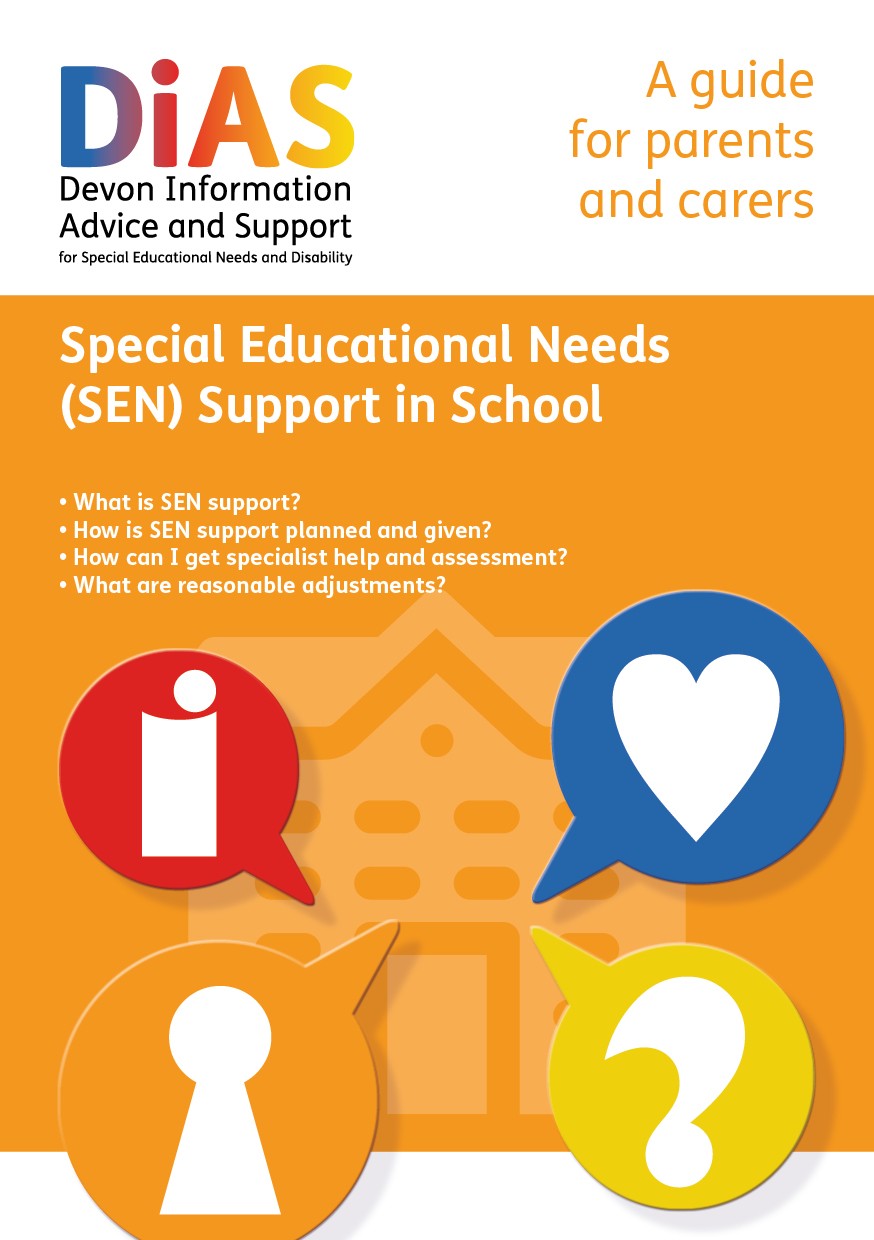Children and young people don’t need to have a diagnosis for them, or their parent carers, to use the service. We support families wherever they are in their journey, from the very early years to post 18 education and training. It’s a free service and it’s available to families across the Devon Local Authority. Torbay and Plymouth both have separate IAS services.
We have a team staffing our enquiry line who support parents and carers, and sometimes young people and young adults with SEND. We have two children and young people’s workers who work directly with children and young people.
We also deal with enquiries from professionals, though the service isn’t specifically for them.

![]() We aim to empower children and young people, and their parent carers, to take part fully in the decisions made about them and their education. We also give information and support around health and social care issues. We help families to be well informed and confident about what they need to do and to play an active role.
We aim to empower children and young people, and their parent carers, to take part fully in the decisions made about them and their education. We also give information and support around health and social care issues. We help families to be well informed and confident about what they need to do and to play an active role.
We do that by giving legally based information and advice. Our aim is always to give that in the right amount and at the right time. As every child is different, we always adapt what we do for each individual or family.
We do not judge people, or their situation or circumstances. We support parent carers and young people to do as much as possible for themselves, using their skills and strengths. That might mean showing a young person how to do something themselves, rather than doing it for them. Or giving support to a parent to prepare well for a meeting rather than attending with them. We always support everyone to find a way forward with their situation themselves, by helping enquirers to work out their priorities and explore their options.
Enquiry line staff use a solution focused approach. That means helping people move towards the future that they want. It involves learning what they can do by using their existing skills, strategies and ideas – rather than focusing on the problem. We work with enquirers to help them understand their situation and then take a positive step forward with whatever problem they come to us with on that day.
The service does three main things. We give:
 The enquiry line is open between 10am and 3pm, Monday to Friday. We are open in school holidays as well term time, apart from the Christmas and New Year period.
The enquiry line is open between 10am and 3pm, Monday to Friday. We are open in school holidays as well term time, apart from the Christmas and New Year period.
You can use the contact form on the website at any time to email us. You can also leave a voicemail message outside of the enquiry line opening hours. The website is available 24/7 and it has information about a wide range of SEND topics.
We aim to offer a consistent and equitable service to our users. To give fair access to the service, we answer enquiries in the order in which they come in, whether by phone or email. We aim to respond to enquirers within 2-3 working days of their initial contact.
Calling us
 When you call us, you’ll usually get through to a member of our enquiry line staff. These are the important things to know about the call:
When you call us, you’ll usually get through to a member of our enquiry line staff. These are the important things to know about the call:
![]() Using our web contact form
Using our web contact form
Just as every child or young person with SEND is different, every individual or family that contacts us is too. That’s why we might give different levels of support, depending on need.
![]() Everyone who makes initial contact with us, whether by phone or by email, gets advice from our enquiry line team. However, there are some circumstances and some families that might need us to give more in-depth support, or a longer period of support. We make these decisions on a ‘case-by-case’ basis. However, these are the kinds of things that we might consider when deciding whether a family needs this type of support.
Everyone who makes initial contact with us, whether by phone or by email, gets advice from our enquiry line team. However, there are some circumstances and some families that might need us to give more in-depth support, or a longer period of support. We make these decisions on a ‘case-by-case’ basis. However, these are the kinds of things that we might consider when deciding whether a family needs this type of support.
We usually bring support to an end when an issue has been resolved or a parent or young person can speak up for themselves. Parent carers and young people can come back to us whenever they need further information or advice.
The DIAS enquiry line is staffed by people doing two roles - Information and Advice Triage Officer and DIAS Officer. Both have the same level of legal training in SEND (IPSEA level 3), and both can give advice by email or phone. DIAS officers can also provide longer term or more in-depth support to those families who need it.
 We have a small team of volunteers who offer some direct support to parent carers, and occasionally to young people. They offer support for specific pieces of work, rather than for an ongoing period of time. Volunteers can give support for the following activities.
We have a small team of volunteers who offer some direct support to parent carers, and occasionally to young people. They offer support for specific pieces of work, rather than for an ongoing period of time. Volunteers can give support for the following activities.
DIAS volunteers work under the supervision of DIAS Officers and they follow the same confidentiality and impartiality rules. All of our volunteers are fully Disclosure and Barring Service (DBS) checked if they’re working with the public. This means a check has been done to make sure they can work with vulnerable groups, including children and young people.
All volunteers working with parents and carers, children and young people are trained in special educational needs and disability (SEND). Some of our volunteers choose to do extra training, or have knowledge and expertise in areas like mediation and tribunals.
We are always looking at and improving our service, to make sure families get the support they want and need.
We collect feedback in several ways using postal questionnaires, telephone interviews, internet surveys and questionnaires following training events. If you want to give us feedback you can complete our online survey feedback survey, which you can find on our website.
You can also contact us directly if you have more detailed comments or a complaint to make.

Page reviewed: April 2024
Page due for review: April 2026
DiAS (Devon, Information, Advice and Support) supports children and young people aged 0-25 with special educational needs and disabilities (SEND), and their parents and carers.
Helpful links
Contact us
Legal
© 2025 Devon Information Advice & Support
Searching...